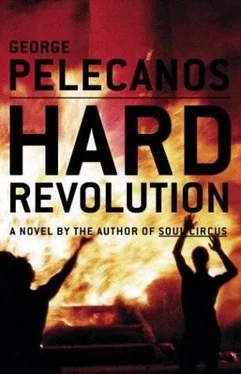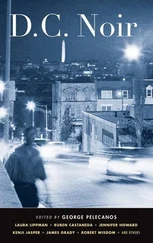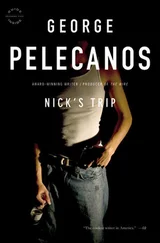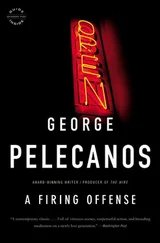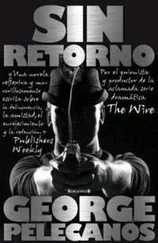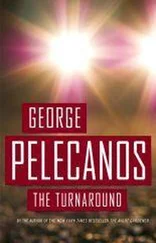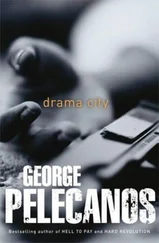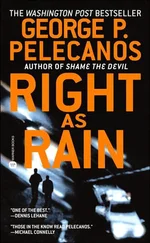“What the hell?” said the grandfather, also named Nick Stefanos, with a gruff voice. But he was not annoyed. In fact, he was amused. He looked across the bench and gave the boy a crooked smile.
BIG NICK STEFANOS parked his Wildcat in the alley behind a fastback Mustang, got a crate of tomatoes out of his trunk, and called through the screen door of the Three-Star before he and his grandson walked inside. He dropped the crate in the small storage room before going through a doorway leading to the dishwashing area behind the counter.
“Niko,” said Mike Georgelakos, holding a spatula, leaning over the grill, his bald dome framed by patches of gray.
“I put the tomatoes in the back.”
“Thanks, boss.”
“Tipota.”
Nick and his grandson went around the counter, nodding at Billy, Mike’s son, who was working colds. Billy, a younger, taller, hairier version of his father, wore an apron and kept a ballpoint pen lodged behind his ear. Over by the urns, a thin waitress pulled down on a black handle and drew a stream of coffee into a cup. The two Nicks found seats on empty stools.
All the booths and half the counter seats were taken. Mike Georgelakos opened for a few hours on Sundays to catch an after-church flurry that occurred between noon and one o’clock. Many of the customers wore dresses and suits. Gospel music came from the radio set on the AM station that normally played rhythm and blues.
A black cop and a white cop, both in uniform, sat at the counter having breakfast. Before them were cups of coffee and plates of eggs, potatoes, grilled onions, and half smokes. Occasionally they said a few quiet words to each other, but mostly they worked on their food. A couple of teenage boys sitting in a booth with their mother stared boldly at the backs of the police officers, studying their size and the service revolvers holstered on their hips.
“That your new car out back, Billy?” said the older Nick.
“It’s a two-plus-two,” said Billy Georgelakos, his eyes on the club sandwich he was making on the board in front of him.
“Orayo eine.”
“Yeah, it’s nice.”
“Tha fas simera?” called Mike from behind the grill.
“No food today,” said Nick Stefanos. “Just a quick caffe for me and a cherry Co-Cola for my boy.”
The frail, pretty waitress drew a coffee for the older man, poured a shot of cherry syrup into a glass of Coke she had pulled from the soda dispenser, and served them both.
“Ella, you do good work.”
“Thank you, Mr. Nick.”
They drank up their coffee and soda. The boy was not uncomfortable here, as his grandfather also owned a lunch counter, Nick’s Grill, on 14th and S, that catered to blacks. Still, in both establishments he was always aware that he was in a different world than his own.
Big Nick left a dollar under his saucer for Ella. He and the boy went to the register, where Mike had just finished ringing up a sale. It was understood that Mike would not give Nick money for the tomatoes and that sometime in the future the debt would be repaid in kind. Also understood was that the drinks were on the house.
“How you doin,’ young man?” said Mike to the boy. “You all right?”
“Yes.”
“Good boy.” Mike turned to the older man, whom he’d known for twenty-some-odd years. “You went to church, eh? I heard the mavros was supposed to talk down there.”
“King?” said Nick Stefanos. “He talked. Got a big crowd, too.”
“He’s gonna make trouble,” said Mike, lowering his voice. “He’s gonna get ’em all stirred up.”
“Whatever’s gonna happen’s gonna happen,” said Nick with a shrug. He looked across the counter at Mike, carrying twenty pounds he didn’t need, sweating, breathing hard from walking down twenty feet of rubber mats. “You can’t stop it, patrioti, so don’t waste your time worryin’ about it. You’re gonna make yourself sick.”
Mike waved his hand. “God damn, you know me, I don’t worry about nothin’.”
“Looks like you can use some help. Where’s your grill man today?”
“He don’t work Sundays. Between me and my boy and Ella, we can handle it all right.”
“Take it easy, Michali, ” said Nick, reaching over the counter to shake Mike’s hand.
“You, too.”
As Nick Stefanos and his grandson left the store, the two cops dropped some change on the counter, got up off their stools, and walked to the register. The boys who had been staring at them so boldly looked down at their plates as the tall men crossed the room.
“How you like it, boys?”
“I’m gonna be dreamin’ about those half smokes tonight,” said the white cop, who had the South in his voice.
“That’s my signature,” said Mike, catching the black cop’s eye. “I learned it from a pro.”
“How much, Mr. Mike?” said the black cop.
“Two dollars for both,” said Mike, charging them two dollars less than he would have charged civilians.
“Have a blessed day, young man,” said the waitress, Ella Lockheart, as she passed behind the black cop, who was in the process of returning his wallet to the back pocket of his slacks.
“You do the same.”
At the door, the young black cop, broad shouldered, dark skinned, and handsome, turned and called to Billy Georgelakos, standing at the colds station.
“Yasou, Vasili.”
“ Yasou, Derek.”
The black cop, Derek Strange, and the white cop, who was named Troy Peters, walked out of the Three-Star and headed toward their squad car, parked out on the street.
STRANGE KEYED THE mic and radioed in to tell the station operator that he and his partner were back on duty. They cruised west down the strip, Peters under the wheel. A few kids were lining up for the matinee at the Kennedy; its marquee read “Joan Crawford goes Berserk! ” Bars, cleaners, and other shops were shuttered. A couple of young men dipping down the sidewalk cold-eyed Strange as the squad car passed.
“Go on, fellas,” said Peters. “Wave to Officer Friendly.”
“Don’t you know the po-lice is your buddy?” said Strange. Peters chuckled, but Strange could not bring himself to smile.
This was the part of the job, the open contempt, that got under Strange’s skin. Wouldn’t have been so bad if he only got it while he was in uniform. But he was reminded of it even when he was not on duty. Once, at a party near Florida and 7th, a woman told him in front of Darla Harris, his date, that what he was doing was a form of betrayal, that, in essence, he was a traitor. But he felt that he was not. He was protecting his people. He was doing a job that few were willing to do and that needed to get done. He had convinced himself of this early on so he could get through his day-to-day.
It was true that he had been warned by the experienced black officers to expect this kind of attitude. But he didn’t know it would continue to bother him as deeply as it did. He talked about it with his friend Lydell Blue whenever he could, because he could not talk about it with Troy Peters. Lydell had also become an MPD cop, straight out of the army. He knew.
Wasn’t everybody. Plenty of people showed him respect. Older folks, mostly, and little kids. Still, as he got into the poorer neighborhoods, he was looked upon as the enemy by everyone, especially by the young. Sometimes he caught it from his own blood. On the afternoon of Strange’s graduation from the academy, his brother, Dennis, high on something, had congratulated him, then said, “You a full-fledged member of the occupying army now.” Strange was tempted to tell his brother that he had no call to be cuttin’ on anyone who had a job, but he held his tongue. Dennis didn’t mean anything by it, for real. He had always been against anything that smelled like the system. His parents, at least, had looked at him with pride.
Читать дальше
